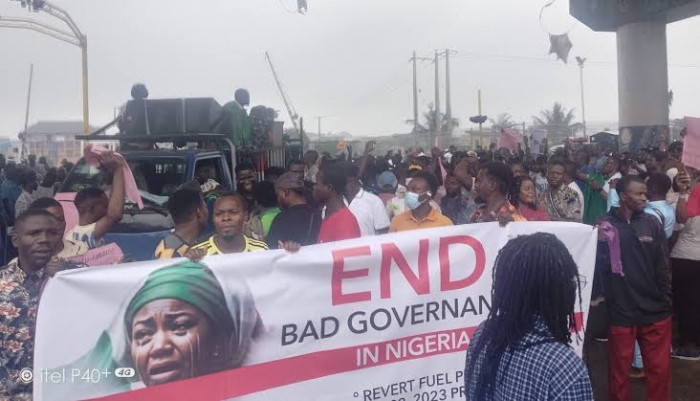The third day of nationwide protests in Nigeria, part of the #EndBadGovernance demonstration, has been marked by escalating tensions between protesters and security forces. The protests, which began on Thursday, are focused on demands for better governance, economic relief, and policy reversals. Key developments on Day 3 include:
1. Violent Dispersal of Protesters in Abuja:
- State Security Services (SSS) and police officers used live ammunition and tear gas to disperse peaceful protesters at the MKO Abiola Stadium in Abuja.
- Journalists covering the event were also targeted, with reports of bullets damaging vehicles.
- The Deputy Commissioner of Police, FCT, initially stated they were there to monitor the protests, but the situation quickly escalated.
2. Protests in Kano with Russian Flags:
- Some protesters in Kano were seen waving Russian flags and calling for intervention from Russian President Vladimir Putin.
- Demonstrators expressed desperation for change, citing hunger and economic hardship.
- The protest in Kano defied a 24-hour curfew imposed by the state government.
3. Incidents in Delta State:
- Police reported that protesters attacked commercial buses on the Asaba-Benin Expressway in Agbor.
- Law enforcement used tear gas to disperse the crowd and clear the road.
4. NLC Condemns Security Forces' Actions:
- The Nigeria Labour Congress (NLC) called on police and security agencies to stop shooting and killing protesters.
- NLC President Joe Ajaero questioned the professionalism of security agencies in handling the protests.
5. Disputed Casualty Figures:
- Amnesty International reported at least 13 deaths during the protests.
- The Nigeria Police Force claimed seven deaths, stating none were caused by security operatives.
- The police reported 681 arrests related to various criminal offenses during the protests.
6. Ongoing Demands:
- Protesters are calling for the reinstatement of petrol subsidies, reduction in public officials' salaries, and measures to address the cost-of-living crisis.
Analysis:
The protests reflect growing public discontent with recent government policies, particularly the removal of fuel subsidies and currency devaluation, which have led to significant economic hardship. The use of force by security agencies has escalated tensions and drawn criticism from human rights organizations and labor unions.
The appearance of Russian flags in Kano suggests a complex geopolitical dimension to the protests, potentially reflecting dissatisfaction with Western-aligned policies and a desire for alternative international support.
The conflicting reports on casualties and the nature of the protests between authorities and demonstrators highlight the contentious atmosphere surrounding the demonstrations.
Conclusion:
As the protests enter their third day, the situation remains volatile. The government's response to the demonstrations and its ability to address the underlying economic concerns will be crucial in determining the trajectory of this civil unrest. The international community is likely to closely monitor developments, particularly given the geopolitical implications suggested by the Russian flag incident in Kano.


































































